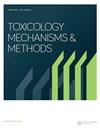铅和β-淀粉样肽中PINK1和Parkin水平的降低诱导线粒体自噬缺陷和细胞凋亡
IF 2.8
4区 医学
Q2 TOXICOLOGY
引用次数: 5
摘要
铅(Pb)是一种环境污染物,通过氧化应激诱导和线粒体功能改变与神经退行性疾病的发生密切相关。线粒体受损可能是阿尔茨海默病(AD)恶化的原因之一。线粒体自噬对保持细胞健康至关重要。为了了解其在铅诱导AD中的作用,我们通过研究SH-SY5Y分化细胞中特异性的线粒体自噬标记蛋白PINK1和Parkin来研究PINK1/Parkin依赖通路。我们的数据表明,暴露于Pb和β -淀粉样肽(a β(25-35)和a β(1-40)单独或不同组合)的细胞中,PINK1和Parkin的水平显著降低,导致线粒体自噬缺陷。此外,本研究还揭示了单独和不同组合Pb和Aβ肽处理细胞时线粒体通透性过渡孔(MPTP)、线粒体质量、线粒体膜电位(MMP)和线粒体ROS生成的状况。暴露组线粒体ROS生成增加,MPTP开放增强,膜电位去极化,线粒体质量减少。此外,在本研究中,我们发现Pb和β -淀粉样肽可以通过激活Bak蛋白来触发细胞凋亡,Bak蛋白通过MPTP从线粒体释放细胞色素c,进而激活细胞溶胶中的AIF(凋亡诱导因子)和caspase-3蛋白。上述发现揭示了PINK1/Parkin介导的线粒体自噬和功能失调线粒体介导的细胞凋亡等机制在铅诱导的神经毒性中的潜在作用。本文章由计算机程序翻译,如有差异,请以英文原文为准。
Defective mitophagy and induction of apoptosis by the depleted levels of PINK1 and Parkin in Pb and β-amyloid peptide induced toxicity
Abstract Exposure to lead (Pb), an environmental pollutant, is closely associated with the development of neurodegenerative disorders through oxidative stress induction and alterations in mitochondrial function. Damaged mitochondria could be one of the reasons for the progression of Alzheimer’s Disease (AD). Mitophagy is vital in keeping the cell healthy. To know its role in Pb-induced AD, we investigated the PINK1/Parkin dependent pathway by studying specific mitophagy marker proteins such as PINK1 and Parkin in differentiated SH-SY5Y cells. Our data have indicated a significant reduction in the levels of PINK1 and Parkin in cells exposed to Pb and β–amyloid peptides, both Aβ (25-35) and Aβ (1-40) individually and in different combinations, resulting in defective mitophagy. Also, the study unravels the status of mitochondrial permeability transition pore (MPTP), mitochondrial mass, mitochondrial membrane potential (MMP) and mitochondrial ROS production in cells treated with individual and different combination of Pb and Aβ peptides. An increase in mitochondrial ROS production, enhanced MPTP opening, depolarization of membrane potential and reduced mitochondrial mass in the exposed groups were observed. Also, in the present study, we found that Pb and β–amyloid peptides could trigger apoptosis by activating the Bak protein, which releases the cytochrome c from mitochondria through MPTP that further activates the AIF (apoptosis inducing factor) and caspase-3 proteins in the cytosol. The above findings reveal the potential role of mechanisms like PINK1/Parkin mediated mitophagy and dysfunctional mitochondria mediated apoptosis in Pb induced neurotoxicity.
求助全文
通过发布文献求助,成功后即可免费获取论文全文。
去求助
来源期刊

Toxicology Mechanisms and Methods
TOXICOLOGY-
自引率
3.10%
发文量
66
期刊介绍:
Toxicology Mechanisms and Methods is a peer-reviewed journal whose aim is twofold. Firstly, the journal contains original research on subjects dealing with the mechanisms by which foreign chemicals cause toxic tissue injury. Chemical substances of interest include industrial compounds, environmental pollutants, hazardous wastes, drugs, pesticides, and chemical warfare agents. The scope of the journal spans from molecular and cellular mechanisms of action to the consideration of mechanistic evidence in establishing regulatory policy.
Secondly, the journal addresses aspects of the development, validation, and application of new and existing laboratory methods, techniques, and equipment. A variety of research methods are discussed, including:
In vivo studies with standard and alternative species
In vitro studies and alternative methodologies
Molecular, biochemical, and cellular techniques
Pharmacokinetics and pharmacodynamics
Mathematical modeling and computer programs
Forensic analyses
Risk assessment
Data collection and analysis.
 求助内容:
求助内容: 应助结果提醒方式:
应助结果提醒方式:


